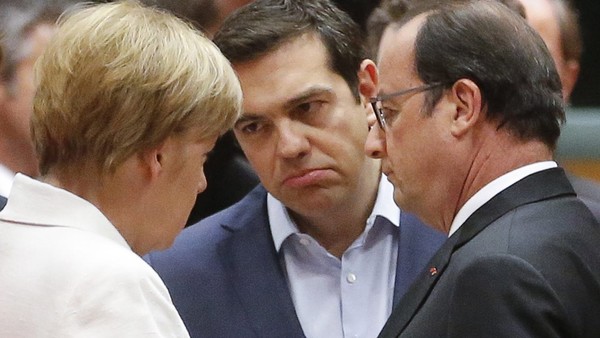Gasp at hubris of EU leaders who think they can overrule domestic politics, writes Martin Sandbu

Greek
Prime Minister Alexis Tsipras (centre) talks with German Chancellor
Angela Merkel (left) and French President François Hollande
The details are still trickling out about the political agreement
struck by the all-night eurozone summit, and there are a lot more
decisions to be made in the coming days. But we can already draw three
lessons. None is particularly edifying.
First, the decisions Europe’s busiest politicians find it appropriate to make are outright bizarre. The draft document that
the eurogroup of finance ministers prepared for leaders on Sunday
contains, among other things, a specific requirement to improve
competition among . . . bakeries.
Perhaps the bakers of Greece
need more competition. Perhaps, at a stretch, we can find some reason
why this would contribute to a higher Greek growth rate. But we should
gasp at the hubris of a class of European politicians who think both
that their time is well spent doing this kind of micromanagement and
that their preferred micro-policies are so conducive to growth they can
overrule the domestic political process.
Greece unquestionably needs reform. But remember where the country was just a year ago. Austerity was paused
in 2014, which allowed growth to return. Athens was in a primary
surplus and needed no further financial aid — only extensions to smooth
out the steep repayment cliffs in 2015 and 2016 that the eurozone and
the International Monetary Fund recklessly left unchanged in the 2012
restructuring. Would it really have been so hard to simply grant the
extensions (without haircuts), let the growth rebound continue (which
would have increased the ability to service the debt) and leave Greeks
to fight out whether and how to fix their country (or not)?
Second, the one constructive party in the past few weeks has been France. After five years of playing second fiddle to Germany — and to Berlin’s tune at that — Paris rediscovered its status as coequal leader of the European project. For all its sternness, Germany does not want to go it alone. The health of the euro would have been stronger today had France retrieved its confidence sooner.
But note what it took. Once Grexit was publicly contemplated at the highest levels in Berlin, the scene was being set for a return to speculative attacks on France itself — not tomorrow, not the day after, but certainly one day. This, we must recall, was the main French motivation for monetary union in the first place. Grexit would have eliminated the main raison d’être for the single currency as seen from Paris.
Finally, Greece capitulated because the European Central Bank forced it
to do so. In flagrant defiance of its treaty obligation to support the
general economic policy of the eurozone — which includes since June 2012
a requirement to separate the health of the banking system from the
solvency of sovereigns — the ECB forced a shutdown of the Greek banking
system and made clear it would only let it function again once a deal on
sovereign finances had been struck.
This has established beyond any doubt that the independence of the eurozone’s central bank from politicians is nothing of the sort. Far from being independent, the ECB does governments’ bidding. But its dependence is selective — and that is something that should worry the citizens of eurozone nations beyond Greece.
No comments:
Post a Comment